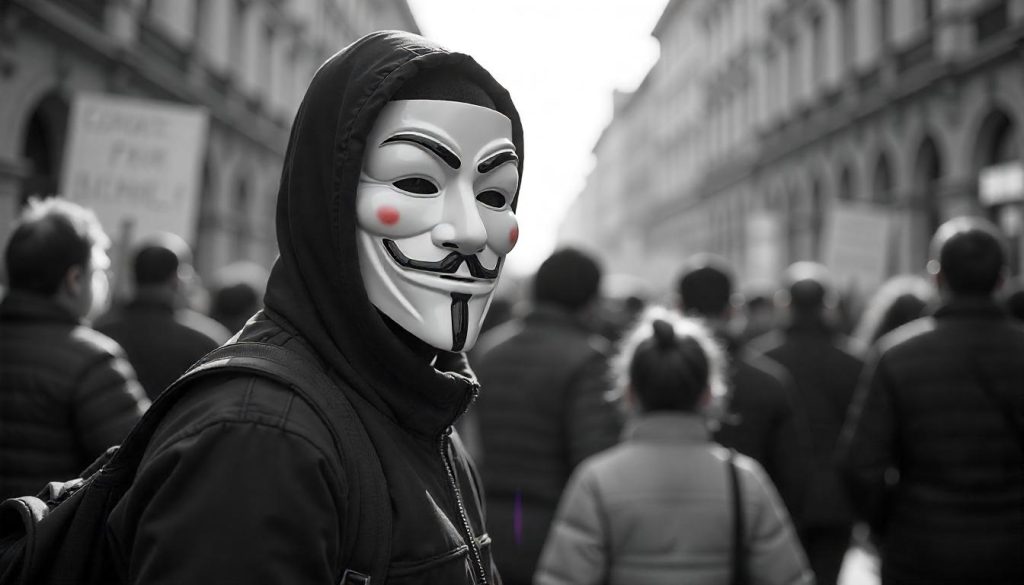When we hear the word “Anonymous,” many of us picture a masked hacker sitting behind a computer screen, launching cyberattacks. But is that all Anonymous does? Or have they actually helped people too? The truth is not so black and white. Anonymous is a complex movement made up of people from all over the world. They don’t have one leader or one agenda. Some of their actions have caused chaos. Others have brought justice. So, has Anonymous helped people or just hacked? Let’s explore both sides of the story.

What is Anonymous?
Anonymous is a decentralized group of online activists and hackers. They’re known for wearing the Guy Fawkes mask, made famous by the film V for Vendetta. This group started around 2003 on internet forums, mainly 4chan. At first, they were more about online pranks. But over time, their actions became more serious and focused on social justice, freedom of speech, and fighting corruption.
The Hacking Side of Anonymous
Let’s not sugarcoat it. Anonymous has hacked — a lot. Some of their attacks have taken down websites, exposed sensitive data, and disrupted major organizations. Here are some of their more controversial actions:
1. Operation Sony (2011)
Anonymous attacked Sony because the company sued a PlayStation hacker. Sony’s websites went down, and user data may have been compromised. Many people were upset, especially gamers who just wanted to play online.
2. Operation Payback (2010)
In response to actions against WikiLeaks, Anonymous targeted companies like PayPal, Visa, and Mastercard. These companies had stopped donations to WikiLeaks. Anonymous launched DDoS (distributed denial-of-service) attacks that made their websites crash.
3. HBGary Federal Hack (2011)
A cybersecurity firm called HBGary planned to expose Anonymous members. In return, Anonymous hacked them, exposed thousands of emails, and embarrassed the company. While some saw it as payback, others questioned whether it crossed the line. These kinds of actions have made many people label Anonymous as cybercriminals. Governments have even arrested some alleged members. Still, there’s more to the story.
The Helping Side of Anonymous
Despite the controversies, Anonymous has also helped people. In fact, many of their operations have been in defense of human rights, against oppressive regimes, and to support free speech. Let’s look at some of those efforts.
1. Arab Spring (2011)
During the Arab Spring, people in countries like Egypt, Tunisia, and Libya were protesting for freedom and democracy. Their governments were trying to block internet access. Anonymous stepped in and helped protesters by taking down government websites and sharing tools to bypass censorship. This support gave people a voice when their governments tried to silence them.
2. Operation Darknet
Anonymous targeted websites involved in child exploitation on the dark web. They exposed names and shut down servers that hosted illegal content. This operation was praised by many for protecting vulnerable children.
3. OpCharlieHebdo (2015)
After the terror attack on the French magazine Charlie Hebdo, Anonymous launched a campaign against extremist groups. They took down ISIS-linked Twitter accounts and websites that spread hate. Their message was clear: freedom of speech must be protected.
4. Support for George Floyd Protests (2020)
After the death of George Floyd in the U.S., Anonymous reappeared and started exposing police corruption. They supported the Black Lives Matter movement and launched attacks on police websites in protest against brutality. These actions showed a more activist side of Anonymous — one that fights for justice rather than just breaking into systems for fun.
Why Does Anonymous Do What They Do?
Unlike most organizations, Anonymous doesn’t have a clear leader or structure. Anyone can act under the name “Anonymous” if they follow certain principles — like fighting censorship, corruption, or abuse of power. This makes their motives both inspiring and unpredictable. Some members want justice. Others may just enjoy the chaos. That’s what makes it hard to define them as “good” or “bad.”
Is Hacking Ever Justified?
This is a tricky question. Some people believe that hacking is always wrong, no matter the reason. Others think it can be a tool for positive change if used responsibly. When Anonymous hacks a child exploitation site, many people cheer them on. But when they take down a major business or expose private information, it can backfire. Innocent people can get hurt. So, it depends on your point of view. Are they digital Robin Hoods? Or are they reckless vigilantes?
Public Reactions to Anonymous
People have mixed feelings about Anonymous. Some see them as heroes. Others call them criminals. Governments and companies often treat them as a threat. But everyday people sometimes support them — especially when they fight for the underdog. For example, during the war in Ukraine, Anonymous declared a “cyber war” against Russia in 2022. They hacked government websites and leaked military data. Many Ukrainians praised these actions as acts of solidarity.
Can We Trust Anonymous?
This is the million-dollar question. Since anyone can act under the Anonymous banner, there’s no way to know who is behind each action. One operation could be done by an activist. The next could be done by someone with darker intentions. That’s both the power and the danger of Anonymous. It’s a movement without a face. It can be a voice for the voiceless — or a source of chaos.
Final Thoughts
So, has Anonymous helped people or just hacked? The answer is: both. Anonymous has definitely hacked — often in bold and controversial ways. But they’ve also stood up for justice, defended the powerless, and challenged oppression. In today’s digital world, they remain a symbol of resistance — loved by some, feared by others. Whether you see them as heroes or hackers, one thing is certain: Anonymous has made a huge impact on the internet and the real world.